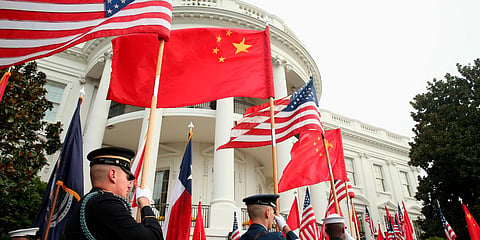

BEIJING: Trump administration officials are "digging a hole" for the future US administration's relationship with China through their actions targeting the country and its officials, China's official Xinhua News Agency said on Thursday.
Xinhua said in an editorial that steps such as restricting visas for the 92 million members of the ruling Communist Party and their families have "again exposed the sinister intentions of extreme anti-China forces in Washington to hijack China-US relations for their own political gain".
The US State Department last week cut the duration of such visas from 10 years to one month, another example of the increasingly hardline stance adopted by the administration in its waning days. While President-elect Joe Biden has signaled he intends to keep pressure on China, he's also expected to seek a return to more conventional, less confrontational style of diplomacy.
Rolling back Trump-era measures could be difficult however, while giving Republicans the chance to renew accusations that Biden is softening Washington's stance toward Beijing. "By relentlessly challenging the bottom line of China-US relations on issues concerning China's core interests, anti-China politicians are not only digging a hole for the next administration's relationship with China, but also eying their own personal political gains," Xinhua said.
US Secretary of State Mike Pompeo has castigated China on almost a daily basis over its policies toward Taiwan, Tibet, Hong Kong, the northwestern region of Xinjiang and the South China Sea. Dozens of officials from mainland China and Hong Kong have been hit with visa bans and other sanctions and new restrictions have been imposed on Chinese diplomats, journalists and academics.
Chinese tech giant Huawei has been shut out of the US market and the US has lobbied other countries to follow suit, often successfully.
On Wednesday, Pompeo accused US universities of caving to Chinese pressure to blunt or bar criticism of the the Chinese communist party, which he said was "poisoning the well of our higher education for its own ends".
Chinese responded by vowing to impose countervailing measures against American officials, saying that US accusations and punitive measures only solidified the Chinese people behind their leaders.
Perhaps with an eye toward Biden, who takes office January 20, Xinhua held open the possibility of better relations if Washington changed its approach. "Today, China and the United States should also uphold the spirit of non-conflict, non-confrontation, mutual respect and win-win cooperation. The two must focus on managing their differences, with the top priority being a smooth transition toward stronger China-US relations," Xinhua said.